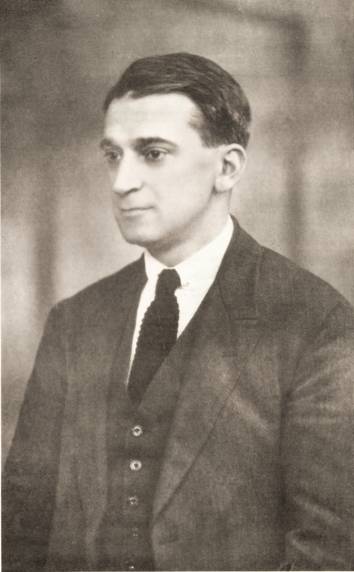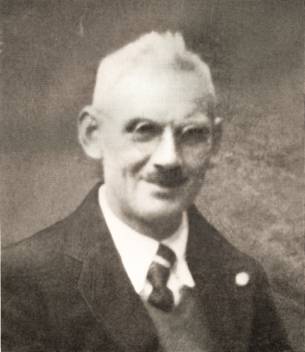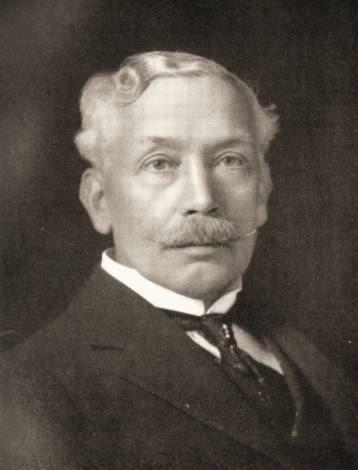In Memoriam
Arthur Hilton Higgs.
Arthur Hilton Higgs died on November 16th, 1926, after an operation following a long illness, the severity of which he successfully concealed from all his friends. Elected in 1922, he was a man of varied interests and accomplishments, and there are few sports in which he had not at one time enthusiastically indulged. Higgs was fond of the open air and the moors and was a keen pot-holer for several years. Unassuming, quiet, fearless of criticism, with an inventive mind and fertile imagination, his was a personality that we have loved and shall miss. We tender our respectful sympathy to his widow and children.
Claud Deane Frankland.
“Of those that hearken to the mystic quest
A score return unscathed, one pays the price ‑ .
The news of the death of Claud Frankland on Great Gable, Sunday, 31st July, 1927, fell as stunning blow upon his friends one by one, scattered on their holidays among the great hills he loved.
Those who knew him as a schoolmaster and that alone, knew him only in part. They would be aware of his great love for boys, his devotion to outdoor sports, his instinctive “playing the game,” and his wholesome influence on those under his charge. They would know that he added to these qualities a keen intellect and a sympathetic understanding. Non-climbers who knew him rarely heard him speak of climbing. They heard of his prowess from others never from himself and they little knew of the position he held among rock-climbers.
But we knew Frankland as a mountaineer, the cragsman transcendent. Deliberate yet quick in movement, unhesitating in his steps, perfect in balance, calm and controlled, eye, foot, and hand in perfect harmony ‑ his progression from one difficulty to another was a picture of grace and apparent ease. Daring things he constantly did, but he never gambled with Fate. He was supremely confident because he knew his own powers.
The natural leader of any party he joined, he never got stale or tired, and as the days wore on and climb succeeded climb, he seemed to recapture the spirit of youth and to infect his companions till it was sheer joy to watch and follow him. “The difficulties are only mental ” was his favourite saying, and under his inspiration it was surprising how these difficulties faded away, but his work showed-as that of any artist will – the study and practice of every detail.
It is scarcely too much to say that Claud Frankland was without equal among cragsmen, and it is fitting that he should sleep his last long sleep at Wasdale, for to us who have climbed with him and loved him, the encircling mountains will for ever wear a mournful glory to his memory.
“This be the verse you grave for me;
Here he lies where he longed to be;
Home is the sailor, home from the sea,
And the hunter home from the hill.”
A fine athlete all his days, Frankland made a climbing expedition to Skye before the War. The Journal records his war service as:- France, Jan., 1927, W. Riding Field Ambulance, Beaumont Hamel, Bullecourt, Avrincourt, Cambrai, Maubeuge, Army of Occupation.
Elected in1919, he quickly took up an active part in the work of the Club, and served on the Committee from 1919 to 1924, when he became Hon. Librarian. His great feats since the War have been mostly mentioned in the Journal, the double; ascent of Scawfell Central Buttress, Esk Buttress, in Wales the Devil’s Kitchen, in Skye the round of the Coolins. At home two of his long climbs at Almescliff have never yet been led; few can follow. In pot-holing he long held himself too old to stand the wet, but he was in the first descent of the great Diccan Pot Shaft (1922), the first to risk the passage through the Second Flood at Gaping Ghyll (1924). His most extensive series of expeditions was Rowten Pot, Jingling Pot, etc., Boggart’s Roaring Hole and Pillar Pots in 1926, and the last were the new G. G. passage of 1927, and the Flood Entrance.
One by one those with whom we have lived the great days fall out, and we can ill spare another loved comrade of camp and road and hill, to whom we looked for counsel and leadership in the years to come.
We tender our most sincere sympathy to his widow, son and daughter.
The Accident.
Chantry Buttress is the right hand edge of the butt end of the Needle Ridge. Thus it is close to the foot of the little gully descending from the nick behind the Gable Needle and close to the start up the Lingmell Crack. There were four in the party, climbing on two ropes. Frankland climbed the first pitch, 25 ft. of Chantry Buttress, waited for Arthur Wood-Johnson to join him, and climbed away from the ledge, traversing diagonally upwards to the left. While endeavouring to belay the rope and looking upwards, Wood-Johnson saw his leader in a vertical climbing position about two feet from the rock and moving outwards. He passed the ledge about ten feet away, some slack was got in, and Wood-Johnson’s hands damaged, but Frankland fell forty feet and, turning a half somersault, struck the steep rocky slope at the foot of the climb. Lawson Cook saw him strike the ground much at his level and rushed over to stop any further movement. Within a short space of time, without regaining consciousness, Frankland’s spirit had passed the Great Divide and found the peace that is more ancient than the hills.
An explorer a little later found at the fatal place a small ledge above a slightly overhanging piece of rock. From the back of this ledge had recently been detached a flat piece of rock. Frankland would naturally hook his fingers into the crack behind the ledge, and give a sharp pull which, with the pressure of his rubbers on the rock below, would have landed him neatly upon the ledge. The handhold broke, it is supposed, for the previous party up the climb is stated to have heard a sharp crack, and the pressure of his feet caused him to come away from the rock.
Frankland’s caution was as marked as his grace and strength, so that it is certain that the handhold must have stood testing from below, As we picture him moving steadily and certainly on far more difficult climbs, it is a struggle to realise that Frankland of all men has perished by a fall, and more to grasp that Great Napes of all crags betrayed him in the rare moment when he depended on one hold.
Alfred Barran.
By the death of Alfred Barran, on October 12th, 1927, at the age of seventy-six years, the Club has lost one of its oldest and most loyal members. Elected a member shortly after the Club’s foundation, he quickly took a keen and a practical interest in its activities and its members. After service on the Committee, he became President in 1903, in succession to William Cecil Slingsby, a position he filled with credit to himself and honour to the Club. For over thirty years he kept up his interest in all that pertained to the welfare of the Club and we are glad to recall that he was present at the last Club meet in Chapel-le-Dale.
Barran was a lover of nature in all its aspects, but the mountains made a special appeal to him. In his earlier years he climbed a great deal in the Alps, especially in the Dolomites, and in 1897 was elected a member of the Alpine Club an honour of which he was justly proud In his mountaineering, as in his life, he had little or no desire for prominent recognition, but to those of us who were privileged to know him as a man, as well as a mountaineer, Alfred Barran has left behind a treasured memory. In his home at Giggleswick he was a perfect host, a man of extensive travel, wide reading, marked culture, and genial, but quiet humour; to be the guest of him and Mrs. Barran was a sincere delight. We all mourn his loss, but shall always remember him as a fine type of English gentleman.
The Losses Of 1927.
At the Annual Dinner, 12th November, 1927, the President, after paying a tribute to the older men among the founders and those who joined the Club in the first year or two of its existence, men of lofty aims and ideals to whose wise oversight the success of the Club was due, concluded his speech as follows
“We meet to-night under the shadow of a strange sequence of great losses in the world of climbers.
“The President who followed after Slingsby’s long reign, Alfred Barran, has lately gone from us. It is good to recall he was at the Meet with us at the Hill Inn last January. He was a very lovable man. An Alpine climber, he joined thirty-four years ago, and, one of the seniors to whom I have referred, he took an active part in moulding the Club into shape.
“Barran died in the fulness of years, but the call over the last pass to the hills beyond came to Frankland in the fulness of his strength and the heyday of his fame. He died on the rocks, amid the great hills he loved. The wild wind is his requiem the crags are his monument. He left with the Yorkshire Ramblers the memory of a charming personality, of glowing enthusiasm for, and boyish enjoyment in, everything that was good. In the world of affairs, he left behind a high professional reputation. A great master in the crags-man’s craft has gone away from among us and left a gap not easily filled, but a story of great doings which is an inspiration.
“Our kindred clubs have suffered losses of men whose names are household words. The Scottish Mountaineering Club has lost that great guideless climber, Harold Raeburn, whose death is traceable to his efforts in the Himalaya.
“Herbert Cain, President of the Fell and Rock Climbing Club, we shall always remember with gratitude as the man whose insight and imagination made a reality of that magnificent memorial to the Glorious Dead – whom we commemorated yesterday – the possession by the nation of the highlands of Scawfell and Gable.
“Philip Minor, ex-president of both the Rucksack Club and the Fell and Rock Climbing Club, was our principal guest three years ago. Still full of the joy of life and with a long record of expeditions, yet he did not begin climbing until he was forty-two. Few men made more or warmer friends.
“Six years ago, Raymond Bicknell proposed the toast of our club and, this year, his personal popularity had made him a Vice-President of the Alpine Club. Known as a great iceman, both in the Alps and Norway, he died, like Frankland, among surroundings where he was wont to be master and, strangely enough, on the very next day.
“These men many of us have known and climbed with. The losses of the kindred clubs are ours; our losses are theirs. Together we mourn and together we rejoice in the memories of high endeavour and achievement their names recall.
“If these men could speak to us still, I think they would say: ‘We know your sorrow; we felt like sorrow for our predecessors but we did not allow sad thoughts to overcome us. Keep us in remembrance – ah ! we know you will not forget – and when you meet together make merry as we used to do; let rejoicing and gladness predominate. Crack the old jokes; sing the old songs; keep your hearts set on the heights; carry on!'”


